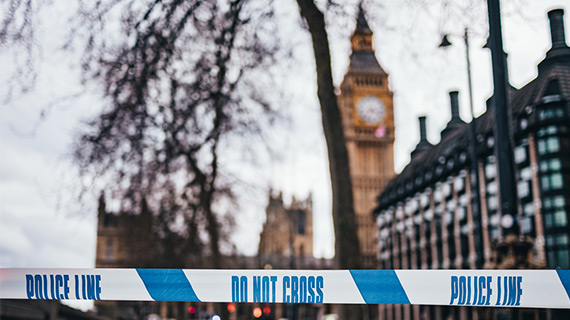
Counter Terrorism and Transnational Crime
A completely unique degree, not on offer anywhere else in the country*. It combines research, theory, and practice to support a multi-disciplinary understanding.
Why study with us?
The World Trade Centre attack (September 11th 2001) has been described as ‘The Dawn of a New Era’ (Martin, 2009), for explaining: contemporary tensions and divisions in society; evolutions to safety and security measures; and, social and political policy changes at a global level. Terrorism, Counter Terrorism & Transnational crime are issues faced not only by the UK but many countries across the world as seen by much publicised incidents. According to the Global Terrorism Index (2015), there has been a nine-fold increase in fatalities as a result of terrorist attacks at a global level since 2001. Terrorism and CT will continue to define the political landscape for future generations.
In 2018 the British Government announced that Counter terrorism police funding was to increase by around £50 million to £757 million, a rise of 7%. This is in recognition of the changing threat from terrorism and to ensure counter terrorism policing has the resources needed to respond and keep the public safe. We have entered a new era in how we understand, perceive and react to terrorism & transnational crime and there is an increased demand for professionals equipped with knowledge in this area in the criminal justice arena.
Canterbury Christ Church University is currently the only University to offer the BSc (Hons) Counter Terrorism & Transnational Crime degree, providing you with the unique opportunity to further explore the complexities of transnational crime. By studying with us you will develop an understanding and knowledge of both historical & current theories & approaches to Terrorism & Counter Terrorism and will have access to academic experts and practitioners across a range of disciplines to help broaden your understanding of the multidisciplinary aspects these areas.
Our new BSc (Hons) Counter Terrorism & Transnational Crime programme has been developed from the popular former Policing (Terrorism & Political Violence) degree. Our supportive and dedicated teaching team will help you to gain more practical & applied experience to support your studies and prepare you for your chosen career. The course also includes input from Guest Lecturers from different areas of the Criminal Justice who will provide sessions on their areas of expertise.
For further information on the BSc (Hons) Counter Terrorism & Transnational Crime degree please visit the online course page.
Terrorism and Political Violence has allowed me to look in-depth into areas of the criminal justice system that truly interest me, as well as providing me with the relevant skills for future employment.
The Terrorism module was one of the most interesting, in-depth and enjoyable modules I have taken in my three years at University. It offers insight into the ongoing issues of modern and historical terrorism.
Specialist Facilities
Hydra Suite
BSc (Hons) Counter Terrorism & Transnational Crime students will have the opportunity to put the theory they have learnt into practice in our Hydra Suite. The Hydra Suite allows our students to simulate policing scenarios under “close-to-real” conditions and experience highly realistic policing incidents, situations as part of their integrated learning. Prof. Jonathan Crego (the Hydra technology developer), is a visiting Professor here at CCCU and the students will have contact with him throughout their degree.
Demonstrations from Kent and the Metroplitan Police
Throughout the degree students will have the opportunity to meet with practicing professionals from a variety of working area’s relevant to contemporary Counter Terrorism. We have working relationships with officers from Kent Police and the Metropolitan Police who give lectures on issues such as current threats and firearms, as well as Prevent leads who discuss Counter Terrorism in practice, and forensic experts with their experiences of analysis of terror attack crime scenes.
Court room
You will also be able to gain some applied knowledge of the criminal justice process through our “Court Room”. This is a lecture theatre that simulates a Court Room and previously was a working Court Room.
Counter Terrorism was by far the most engaging and varied part of my studies; offering a peek into extremist groups that carry out atrocious acts and branching down into the 'how' and 'why' they participate. A genuinely interesting subject that I still draw upon today.
What can you do next?
On completion of your degree there are a range of routes open to you. Graduates will be able to apply to join the Police through the degree holder entry route or could look apply for direct entry / fast track Detective schemes offered by forces. Further opportunities exist as investigators for the National Crime Agency, Intelligence Agencies, The UK Border Force, Private Businesses, Global Risk Analysis Companies, the Armed Forces, Her Majesty’s Inspectorate of Constabulary, Fire and Rescue Services, and the security services.
The Terrorism and Political Violence module offered a bespoke insight into the complexities of how and why terrorism occurs worldwide; and, the strategies governments use to tackle it. As a serving Police Officer with the Metropolitan Police, I have drawn upon my studies here on many occasions which have helped me massively in the job.
In addition, there are a number charitable and voluntary organisations working with the criminal justice sector and vulnerable groups, such as Victim Support, Mind, Shelter, Nacro, Prince’s Trust, Porchlight, Barnardo’s etc offering suitable job opportunities. It is important to note that the knowledge and skills that you gain from doing a Counterterrorism and Transnational Crime degree are transferable to other careers and therefore you could embark on a wide range of career pathways, and should not feel tied to the professions.
* - information correct as of November 2019